形容词和副词经典讲解共41页
初中英语语法:形容词和副词(共46张PPT)

②"比较级+and+比较级" 表示"越来越..."。 他越来越高。 He is getting taller and taller.
形容词副词比较级、最高级的变化与运用方法 LOGO
补充 比较级的其它表达方式
③"the+比较级,the+比较级" 表示"越...越.."。 The more careful you are,the fewer mistakes you'll make. The harder you work , the better you'll be.
回顾 LOGO
1.形容词所做成分 2.形容词排序 3.副词的分类及所做成分 4.部分形容词变副词规则 5.形容词副词比较级、最高级的变化与运用方法
LOGO
very 主要修饰形容词或副词
The dictionary is very useful. 这本词典很有用。 He drove very fast. 他的车开得很快。
修饰副词 too,要用 much
It is much too expensive. 这ห้องสมุดไป่ตู้贵了。
LOGO
much 主要修饰动词 通常 否定句/疑问句 修饰过去分词
She doesn't like him very much. Does she much like him? / Does she like him much?
形容词副词比较级、最高级的变化与运用方法 LOGO
注意
①在比较等级中常用much, far, even等常 修饰比较级,表程度。 ②在比较等级的句型中,比较的双方必须是同 类事物,否则会引起歧义。即人与人, 物与 物的比较。
形容词与副词讲解
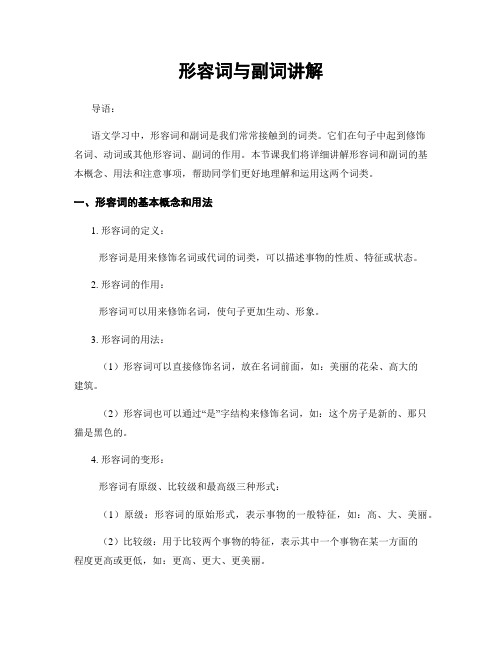
形容词与副词讲解导语:语文学习中,形容词和副词是我们常常接触到的词类。
它们在句子中起到修饰名词、动词或其他形容词、副词的作用。
本节课我们将详细讲解形容词和副词的基本概念、用法和注意事项,帮助同学们更好地理解和运用这两个词类。
一、形容词的基本概念和用法1. 形容词的定义:形容词是用来修饰名词或代词的词类,可以描述事物的性质、特征或状态。
2. 形容词的作用:形容词可以用来修饰名词,使句子更加生动、形象。
3. 形容词的用法:(1)形容词可以直接修饰名词,放在名词前面,如:美丽的花朵、高大的建筑。
(2)形容词也可以通过“是”字结构来修饰名词,如:这个房子是新的、那只猫是黑色的。
4. 形容词的变形:形容词有原级、比较级和最高级三种形式:(1)原级:形容词的原始形式,表示事物的一般特征,如:高、大、美丽。
(2)比较级:用于比较两个事物的特征,表示其中一个事物在某一方面的程度更高或更低,如:更高、更大、更美丽。
(3)最高级:用于比较三个或三个以上事物的特征,表示其中一个事物在某一方面的程度最高或最低,如:最高、最大、最美丽。
二、副词的基本概念和用法1. 副词的定义:副词是用来修饰动词、形容词、其他副词或整个句子的词类,可以表示时间、地点、方式、程度等概念。
2. 副词的作用:副词可以使句子更加丰富、准确,增加句子的表达力。
3. 副词的用法:(1)副词可以修饰动词,表示动作的方式、程度等,如:慢慢地走、非常努力地学习。
(2)副词可以修饰形容词,表示形容词的程度,如:非常漂亮、很高兴。
(3)副词可以修饰其他副词,表示副词的程度,如:非常快速地跑、很认真地听。
(4)副词可以修饰整个句子,表示整个句子的态度、语气等,如:幸运地,我们赢得了比赛。
4. 副词的变形:副词有原级、比较级和最高级三种形式,变形规则和形容词相似。
三、形容词和副词的注意事项1. 形容词和副词的区别:形容词主要修饰名词,副词主要修饰动词、形容词或其他副词。
形容词和副词的用法
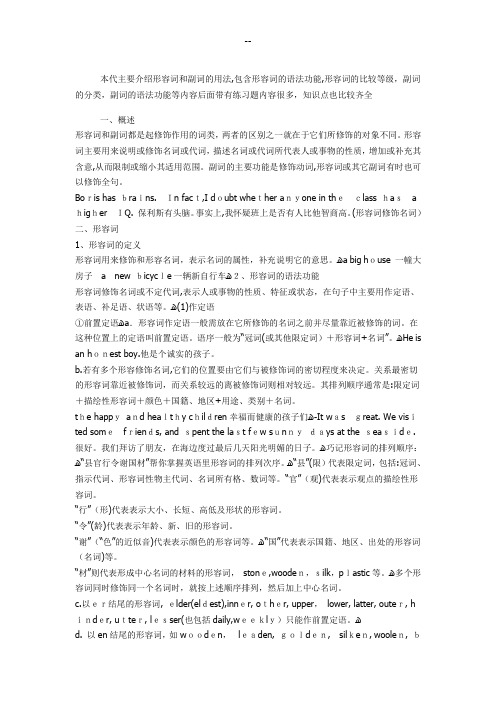
本代主要介绍形容词和副词的用法,包含形容词的语法功能,形容词的比较等级,副词的分类,副词的语法功能等内容后面带有练习题内容很多,知识点也比较齐全一、概述形容词和副词都是起修饰作用的词类,两者的区别之一就在于它们所修饰的对象不同。
形容词主要用来说明或修饰名词或代词,描述名词或代词所代表人或事物的性质,增加或补充其含意,从而限制或缩小其适用范围。
副词的主要功能是修饰动词,形容词或其它副词有时也可以修饰全句。
Boris has brains.In fact,I doubt whether anyone in theclass hasa higherIQ. 保利斯有头脑。
事实上,我怀疑班上是否有人比他智商高。
(形容词修饰名词)二、形容词1、形容词的定义形容词用来修饰和形容名词,表示名词的属性,补充说明它的意思。
ﻫa big house 一幢大房子a new bicycle一辆新自行车ﻫ2、形容词的语法功能形容词修饰名词或不定代词,表示人或事物的性质、特征或状态,在句子中主要用作定语、表语、补足语、状语等。
ﻫ(1)作定语①前置定语ﻫa.形容词作定语一般需放在它所修饰的名词之前并尽量靠近被修饰的词。
在这种位置上的定语叫前置定语。
语序一般为“冠词(或其他限定词)+形容词+名词”。
ﻫHe is an honest boy.他是个诚实的孩子。
b.若有多个形容修饰名词,它们的位置要由它们与被修饰词的密切程度来决定。
关系最密切的形容词靠近被修饰词,而关系较远的离被修饰词则相对较远。
其排列顺序通常是:限定词+描绘性形容词+颜色+国籍、地区+用途、类别+名词。
the happyand healthy children幸福而健康的孩子们ﻫ-It wasgreat. We visited somefriends, and spent the last few sunnydays at the seaside. 很好。
我们拜访了朋友,在海边度过最后几天阳光明媚的日子。
初中英语语法—形容词、副词PPT课件

2. Don’t worry. There is __C__ about your illness.
A.serious something B. anything serious
C. nothing serious D. some thing
3.There is __C__ in today’s newspaper. It’s boring.
1.Is there anything interesting in today’s newspaper ?
2. I have something important to tell you.
-
7
1. Sam is hungry, he’d like to eat _C___delicious.
A. some B. any C. something D. somewhere
The windows of our classroom are cleaner than those of theirs.
-
23
1、as+形容词原形+as
Tom is as tall as Mike.
There are as many students in our
school as yours.
3、… too+原级+ to do sth.
He is too young to join the army.
4、形容词原级+ enough to do sth.
This truck is big enough to carry 5 tons.
-
25
1、两者之间的比较,句中有明显的标志词than
Tom is taller than John
形容词和副词经典讲解分析解析共41页
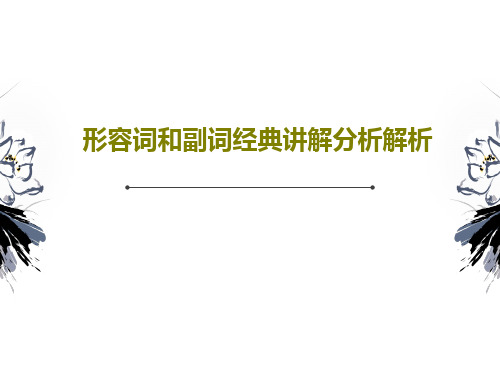
41、学问是异常珍贵的东西,从任何源泉吸 收都不可耻。——阿卜·日·法拉兹
42、只有在人群中间,才能认识自 己。——德国
43、重复别人所说的话,只需要教育; 而要挑战别人所说的话,则需要头脑。—— 玛丽·佩蒂博恩·普尔
44、卓越的人一大优点是:在不利与艰 难的遭遇里百折不饶。——贝多芬
45、自己的饭量自己知道。——苏联
形容词和副词经典讲解分析解析
36、“不可能”这个字(法语是一个字 ),只 在愚人 的字典 中找得 到。--拿 破仑。 37、不要生气要争气,不要看破要突 破,不 要嫉妒 要欣赏 ,不要 托延要 积极, 不要心 动要行 动。 38、勤奋,机会,乐观是成功的三要 素。(注 意:传 统观念 认为勤 奋和机 会是成 功的要 素,但 是经过 统计学 和成功 人士的 分析得 出,乐 观是成 功的第 三要素 。
形容词和副词的知识点归纳
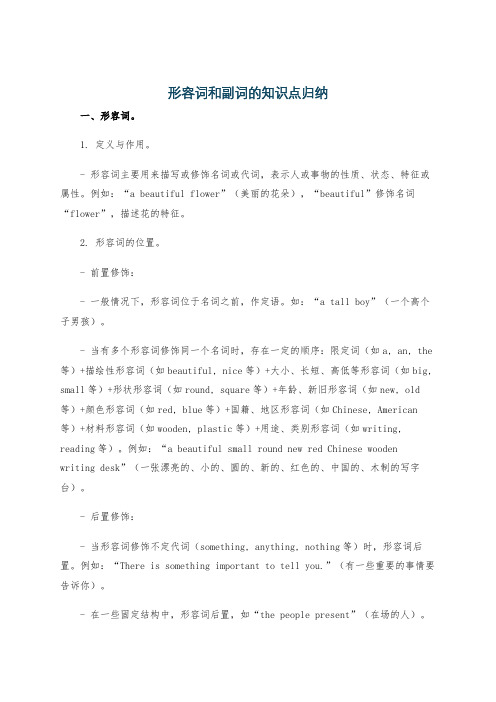
形容词和副词的知识点归纳一、形容词。
1. 定义与作用。
- 形容词主要用来描写或修饰名词或代词,表示人或事物的性质、状态、特征或属性。
例如:“a beautiful flower”(美丽的花朵),“beautiful”修饰名词“flower”,描述花的特征。
2. 形容词的位置。
- 前置修饰:- 一般情况下,形容词位于名词之前,作定语。
如:“a tall boy”(一个高个子男孩)。
- 当有多个形容词修饰同一个名词时,存在一定的顺序:限定词(如a, an, the 等)+描绘性形容词(如beautiful, nice等)+大小、长短、高低等形容词(如big, small等)+形状形容词(如round, square等)+年龄、新旧形容词(如new, old 等)+颜色形容词(如red, blue等)+国籍、地区形容词(如Chinese, American 等)+材料形容词(如wooden, plastic等)+用途、类别形容词(如writing, reading等)。
例如:“a beautiful small round new red Chinese woodenwriting desk”(一张漂亮的、小的、圆的、新的、红色的、中国的、木制的写字台)。
- 后置修饰:- 当形容词修饰不定代词(something, anything, nothing等)时,形容词后置。
例如:“There is something important to tell you.”(有一些重要的事情要告诉你)。
- 在一些固定结构中,形容词后置,如“the people present”(在场的人)。
3. 形容词的比较级和最高级。
- 规则变化:- 一般在词尾加 -er(比较级)和 -est(最高级)。
如:tall - taller - tallest。
- 以不发音的e结尾的单词,加 -r和 -st。
如:nice - nicer - nicest。
形容词副词讲解

Surprisingly, he got home so early.
2.频度副词: often, always, usually, seldom, never, sometimes,hardly 等的位置 She always goes to her aunt’s by train. He had hardly got up when the telephone rang. We usually have a discussion after class.
形容词的句法功用
形容词是用来修饰名词和代词,表示人和事物的特 征和性质,在句中作定语、表语、宾补、状语
They have just bought a new car. (定语)
The tomato soup is delicious. (表语)
I thought him honest.
(宾补)
She came back home, cold and hungry.
3. alive / live / lively / living --- adj.
4. alive – 表语,后置定语 “活的”
5. living – 表语、定语 “活的”
6. lively
“ 活跃的、充满生机的”
7. live [laiv] 1)“活的=living” 2) “实况转播的”
4. ill / sick 5. sick:有病的 --- ,定语, 表语 6. ill:有病的 --只作表语; 恶意的,坏的 – 作定语
三. 形容词、副词倍数的表达法
1) 倍数as+原级 +as This room is twice as big as that one They produced three times as many TV sets as they did last year.
形容词副词ppt课件

1.You can’t sit on this newly bought chair___. fort fortable fortably D.with comfortable 2. The apple tastes _____ and sells ___ . A. well; well B. good; good C. good; well D. well; good 3. Your answer sounds _____ . A. correct B. correctly C. correctness D. correcting
A
描绘性形容词—大小---长短---新旧---颜色---国籍---材料
( 2004辽宁) John Smith, a successful businessman, has a ____ car. large German white large white German white large German German large white
It is quite fine today.
I bought something to drink on my way home.
时间地点副词放在名词或代词之后
adv. 作定语
She is out.
on, in, up, down, out, off, back, upstairs, away…
表语
宾补
状语
adj
形容词用于修饰名词或代词,表示人或事物的属性或特征等
√
√
√
√
adv
副词是用来说明动作或状态的特征,说明时间,地点,程度等概念。它用来修饰动词、形容词、副词、短语或句子。
√
√
英语形容词和副词ppt课件
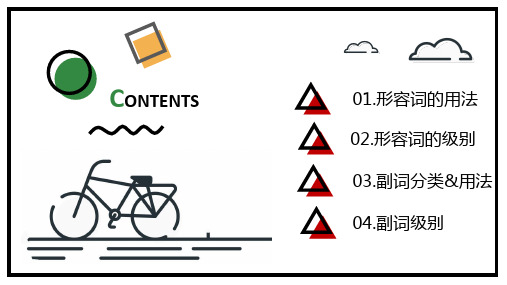
做状语
作状语,表示伴随、原因、结果等。
eg.He went to bed , cold and hungry .
She后置:
A. 修饰some, any, no, every 等构成的复合不定代词要后置。 something new; nothing serious; anything interesting
PART TWO
形容词级别
1.规则形容词的比较级和最高级(4种)
⑴直接加-er , -est :
young
clever
brave
younger cleverer
braver
youngest cleverest
bravest
⑵辅音字母 + y 结尾的变 y 为 i 再加 -er、-est :
happy
B.interesting,be interested
C. interested; be interesting D. interesting; interest
3.I’m very_____ on hearing the_______ news.
A.surprised, surprising B.surprising, surprised
............的
1.通常放在名词之前
a blue cap
a big orange
形容词既可修饰单数也可修饰复数
a red strawberry three red strawberries
2.可以放在 be 动词之后 This suit is yellow. These suits are yellow. The apple is red . The apples are red .
初中英语语法形容词和副词
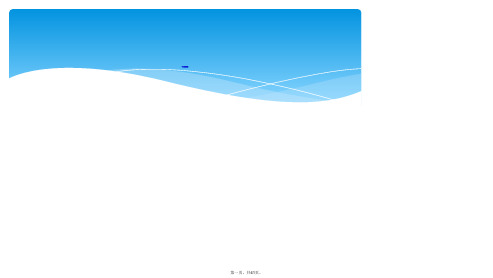
修饰形容词作状语,位于形容词前; 修饰副词作状语位于另一副词前。
例如:He walked quietly into his bedroom. You have a very nice watch.
You are driving too fast.
第十四页,共41页。
位置
④“half as+形容词原级+as”表示“……是……的一半”。
His apples are half as many as his sister's.
第二十三页,共41页。
形容词、副词的比较级和最高级变化
1. 规则变化
1) 一般情况下,单音节或双音节的形容词(或副词)比较级+er , 最高级+est 如: clever-cleverer-cleverest, few-fewer-fewest
small-smaller-smallest等。 2) 以e结尾的词,比较级+r,最高级+st 即可。 如:
nice-nicer-nicest cute-cuter-cutest large-larger-largest
第二十四页,共41页。
3) 以辅音字母+y结尾的变y为i+er或est。如:
easy-easier-easiest , happy-happier-happiest 再如:early, busy, heavy, dirty, lazy也如此。
第八页,共41页。
(3)以ing结尾的形容词通常修饰物,以ed结尾的形容词通常修饰人。 如:interesting(有趣的),interested(感兴趣的) exciting(令人兴奋的),excited(兴奋的)
(4)常见形容词的近义词归类。 large—big,glad—happy/pleased,clever—bright,dear—expensive, broken—worn out,hard—difficult,fine—well,ill—sick, nice—kind/fine/good/beautiful,alone—lonely
高中英语语法:形容词和副词(共61张PPT)

一、形容词和副词的句法功能
1.作定语 形容词作定语一般位于被修饰词的前面;副词作定语多表示时间 或地点,位于被修饰词的后面。 Widespread poverty in Africa means that many people there cannot get the water, clothing, housing, electricity, or education they need.非 洲普遍的贫穷意味着那里的许多人不能获得他们需要的饮用水、 衣服、房屋、电力及教育。 The people there were friendly.那儿的人很友好。(副词作定语须 后置)
the English英国人
(2)“the+形容词”表示抽象概念,作主语时谓语动词用单数。
the best最好的情况
the unknown未知的事
the impossible不可能的事
the right正确的事
二、形容词和副词的位置
1.形容词的位置 (1)一般情况下,单个形容词都位于所修饰的名词前。
一二、介 形词 容的 词分 和类副词的位置
(3)形容词也可位于被修饰名词之后。
③两个意义相近或相反的形容词用and, or或but连接,作定语时须后 置。 Power stations, large or small, have been set up all over the country.大大 小小的发电站已经在全国建立起来了。 All the people on this island, young or old, are fond of music.这个岛上的 老老少少都喜欢音乐。(意义相反。) ④当“形容词+不定式”构成的短语作定语时。 A man so difficult to please must be hard to work with.一个如此难以取悦 的人一定很难共事。 He enjoys the music pleasant to listen to.他很喜欢这首听起来很好听的 音乐。
英语形容词和副词课件

补充 much too+adj/adv
much too tired/strong
too much + 不可数名词
too much water/homework
. Allen had to call a taxi because the box
was ____A___ to carry all the way home.
fort
fortable
fortably D.with comfortable
3. The apple tastes __C___ and sells ___ .
A. well; well
B. good; good
C. good; well
D. well; good
4. Your answer sounds __A___ .
kind---------kindly
但是下列单词以-ly结尾,但却是形容词而非副词:
lively、lonely、lovely、deadly、(致命的,死一般的)
friendly、ugly、silly、likely、brotherly、timely等。
有些副词加-ly与不加-ly意义差别较大:
hard辛苦地/hardly几乎不 deep深地;长时间地/deeply程度深地 high具体的高/highly高度的 close近地/closely密切地;仔细地 wide/widely;(广泛的)free免费地/freely随心所欲地 just刚才/justly正义地;公正地 late迟地/lately最近 sharp准时地/sharply锋利地;严厉地 near/nearly(几乎)
1.we decided not to climb the mountains
形容词和副词英语语法讲解PPT

• He had worked hard all his life .(修饰动词) • He is very diligent.(修饰形容词)
• You can find books on that subject quite easily .(修饰副词)
• Luckily she was in when I called .(修饰句 子)
比较级 1. 构成形式: - er
注意不规则变化
原级
比较级
much/many more ill/bad/badly worse
little
less
good / well better
far
farther
st worst least best farthest furthest
1.She doesn’t speak_A__ her friends, but her written work is excellent.
1.This ____A___ girl is Lind’s cousin.
A. pretty little Spanish
B. Spanish little pretty
C. Spanish pretty little D. little pretty Spanish
2. One day they crossed the __A__bridge behind the palace.
E. 某些形容词,如: present (在场的,出席的), involved(有关的), concerned (相关的), left (剩下 的), mentioned (提及的), selected (当选的)等。 如: the students present (出席的学生)
形容词和副词的用法大全PPT课件

1.Do sports every day to healthy keep______h(ehaevaillth). 2.It snowedy____h_e_a(vhyeavy) yesterday. 3.The rain wsiullnbney______(heavy) in some places.
第18页/共42页
More examples: 1.He is the youngest of all the children. 2.This book is the most interesting of all books. 3.America is the most developed country in the world.
broken 4. It will be _____(sun) tomorrow. 5.Her pen was _______(break).
第1页/共42页
一、形容词和副词的概念
形容词:是修饰名词(人或事物),表示名 词的性质,特征或属性一种词类。 它在句中作定语、表语和宾语补足
语。 副词:用来修饰动词、形容词及其他副词
_h_e_a_v_i_e_st_____________
_m_o_s_t_d_e_li_c_io_u_s_________ __m__o_s_t _______________
第17页/共42页
比较级的用法: …than… 1.汤姆比杰克高. Tom is taller than Jack. 2.这只箱子要比那只箱子大.
2.She looks fine. 3.They turn green.
第3页/共42页
③如果形容词修饰不定代词something, anything, everything, nothing等时,要放在不定 代词后面。 如:something interesting nothing new + else 修饰不定代词和疑问代词时,要后置。 如:
形容词副词讲义

形容词副词定义:中文的意思是“……的”的词是形容词,用来修饰名词;中文意思是“……地”的词是副词,用来修饰动词、形容词或副词形容词与副词在句中的位置形容词形容词的比较级在句中的位置名词所有格副词的比较级形容词副词的转换考点清单练习:练习① It is a ____(sun) day. ② It is a _____(rain) day.③ I think you are a _____(luck) girl. ④ The teacher said he had _____to tell us.A. anything importantB. important anythingC. something importantD. important something⑤ Look !Jack is ____(excite,excited) . ⑥ I feel ____(happy) every day.⑦ The baby is sleeping ,please keep______(quiet,quietly)考点二:形容词的比较级1.规则的形容词比较级(1)在形容词词尾加上“er”“est”构成比较级、最高级:bright(明亮的)—brighter—brightest broad(广阔的)—broader—broadest cheap(便宜的)—cheaper—cheapest clean(干净的)—cleaner—cleanest clever(聪明的)—cleverer—cleverest cold(寒冷的)—colder—coldestcool(凉的)—cooler—coolest dark(黑暗的)—darker—darkest dear(贵的)—dearer—dearest deep(深的)—deeper—deepestfast(迅速的)—faster—fastest few(少的)—fewer—fewestgreat(伟大的)—greater—greatest hard(困难的,硬的)—harder—hardest high(高的)—higher—highest kind(善良的)—kinder—kindestlight(轻的)—lighter—lightest long(长的)—longer—longestloud(响亮的)—louder—loudest low(低的)—lower—lowestnear(近的)—nearer—nearest new(新的)—newer—newestpoor(穷的)—poorer—poorest quick(快的)—quicker—quickest quiet(安静的)—quieter—quietest rich(富裕的)—richer—richestshort(短的)—shorter—shortest slow(慢的)—slower—slowestsmall(小的)—smaller—smallest smart(聪明的)—smarter—smartest soft(柔软的)—softer—softest strong(强壮的)—stronger—strongest sweet(甜的)—sweeter—sweetest tall(高的)-taller-tallestthick(厚的)—thicker—thickest warm(温暖的)—warmer—warmest weak(弱的)—weaker—weakest young(年轻的)—younger—youngest (2).双写最后一个字母,再加上“er”“est”构成比较级、最高级:big(大的)—bigger—biggest fat(胖的)—fatter—fattesthot(热的)—hotter—hottest red(红的)—redder—reddestsad(伤心的)—sadder—saddest thin(瘦的)—thinner—thinnestwet(湿的)—wetter—wettest mad(疯的)—madder—maddest(3).以不发音的字母e结尾的形容词,加上“r”“st”构成比较级、最高级:able(能干的)—abler—ablest brave(勇敢的)—braver—bravest close(接近的)—closer—closest fine(好的,完美的)—finer—finestlarge(巨大的)—larger—largest late(迟的)—later—latestnice(好的)—nicer—nicest ripe(成熟的)—riper—ripestrude(粗鲁的)—ruder—rudest safe(安全的)—safer—safeststrange(奇怪的)—stranger—strangest wide(宽广的)—wider—widestwise(睿智的,聪明的)—wiser—wisest white(白的)—whiter—whitest(4).以字母y结尾的形容词,把y改为i,再加上“er”“est”构成比较级、最高级:busy(忙碌的)—busier—busiest dirty(脏的)—dirtier—dirtiestdry(干燥的)—drier—driest early(早的)—earlier—earliesteasy(容易的)—easier—easiest friendly(友好的)—friendlier—friendliest funny(好玩的)—funnier—funniest happy(开心的)—happier—happiest healthy(健康的)—healthier—healthiest heavy(重的)—heavier—heaviesthungry(饿的)—hungrier—hungriest lazy(懒惰的)—lazier—laziestlucky(幸运的)—luckier—luckiest naughty(调皮的)—naughtier—naughtiest noisy(嘈杂的)—noisier—noisiest pretty(美丽的)—prettier—prettiestsilly(傻的)—sillier—silliest spicy(辣的)—spicier—spiciestthirsty(渴的)—thirstier—thirstiest ugly(丑的)—uglier—ugliest(5).双音节、多音节形容词,在单词前面加上“more”“most”构成比较级、最高级:afraid(害怕的)—more afraid—most afraidbeautiful(美丽的)—more beautiful—most beautifulcareful(仔细的)—more careful—most carefulcheerful(开心的)—more cheerful—most cheerfulcrowded(拥挤的)—more crowded—most crowdeddangerous(危险的)—more dangerous—most dangerousdelicious(美味的)—more delicious—most deliciousdifficult(困难的)—more difficult—most difficultexciting(令人兴奋的)—more exciting—most excitingexpensive(昂贵的)—more expensive—most expensivefamous(著名的)—more famous—most famousfrightened(受惊的)—more frightened—most frightenedfrightening(令人害怕的)—more frightening—most frighteninghard-working(勤奋的)—more hard-working—most hard-workinghelpful(有帮助的)—more helpful—most helpfulhonest(诚实的)—more honest—most honestimportant(重要的)—more important—most importantinteresting(有趣的)—more interesting—most interestingpolite(有礼貌的)—more polite—most politeterrible(可怕的)—more terrible—most terribletired(累的)—more tired—most tired(6).不规则变化的形容词:bad(坏的)—worse—worst far(远的)—farther—farthest (far—further—furthest)good(好的)—better—best ill(病的)—worse—worstlittle(少的)—less—least many(多的)—more—most much(多的)—more—most old(年老的)—older—oldest ( old—elder—eldest) well(好的,身体好的)—better—best练习1. Is your friend ____ (young) than you ?2. Shanghai is one of ______ (big) cities in the world.3. Do you think English is _____important than maths。
